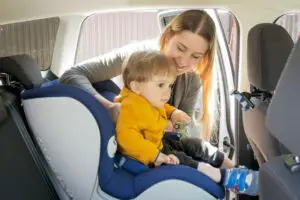North Carolina may have places that you would want to visit with your family, and as most families have children, you might need to go through this article to be aware of things before you get pulled over and cited by an officer for risking the safety of your children.
The reason why they would stop you is because of Car seat laws in North Carolina. They have been created to keep your children safe in a crash.
From 1 to 4, they shall use the rear-facing seat. After hitting four, they may use a front-facing seat, and after they are over 60 pounds, they can use a booster seat, provided they are at least eight years of age.
While keeping the age and weight in mind, these rules may seem a little hard to wrap around, but you do not have to worry. I have got you covered.
Table of Contents
- 1 North Carolina Car Seat Requirements By Ages
- 2 Car Seat Weight And Height Requirements In North Carolina
- 3 Type Of Car Seat Laws In North Carolina
- 4 When Is The Time For My Child To Sit In The Front Seat In North Carolina?
- 5 What Happens If You Leave Your Child In A Car In North Carolina?
- 6 Taxi Car Seat Laws In North Carolina
- 7 North Carolina Law Regarding Car Seats In Accidents
- 8 Uber Car Seat Laws In North Carolina
- 9 Conclusion
North Carolina Car Seat Requirements By Ages

These rules apply to children with different age sets.
For your ease, I have categorically gone through each age set your child might be in, along with the seats you will have to use.
1 Year Old
Children of year one or younger in North Carolina will have to use a rear-facing seat as it’s the best for them at such a young and fragile state.
They have to be around 20 pounds at this stage.
2 Year Old
Two year olds will be treated the same way. They shall have to ride in a rear-facing seat as long as they are around 20 pounds of weight or at least less than 35 pounds.
3 Year Old
Children of this age set will continue to use a rear-facing seat. They will have to remain in it until or unless they are over 35 pounds.
4 Year Old
Things may start to change when your child hits the age of 4 in North Carolina. They will be allowed to sit in a front-facing booster seat and have to be over 35 pounds.
5 Year Old
At five years of age, your child will have to stay in the front-facing seat and enjoy the same treatment. Until or unless they are over 40 pounds of weight.
6 Year Old
Regardless of your child being 6, they shall be seated in the front-facing seat, which will continue until they are over 40 pounds and exceed the height of 4 feet and 9 inches.
7 – 9 Year Old
For seven-year olds, they shall stay in a front-facing seat until they are over 40 pounds.
Once they are over that weight limit, they will shift to a booster seat, generally around 8. The same applies for nine years olds in North Carolina as they will use a booster seat as well.
10 Year Old
A 10-year-old shall also use a booster seat until they exceed 70 pounds of weight and are over 4 feet and 9 inches in height.
Car Seat Weight And Height Requirements In North Carolina

When a child is below 20 pounds, they shall continue using a rear-facing seat.
Once they are over 20 and in the bracket of 35 pounds and beyond, they shall start using a front-facing seat where they will stay until they are physically unable to fit in it.
Moreover, once they are about 40 pounds of weight and over, they will be shifted to a booster seat that they will stay in until they are over 80 pounds and exceed 4 feet and 9 inches in height.
Type Of Car Seat Laws In North Carolina
Since there are different types of seats created for different occasions, the rules and regulations for those seats will vary accordingly.
Therefore, different rules have been discussed for the different seating arrangements that the law has created for different age sets.
1. Rear Facing Car Seat
A child around the age of 1 uses a rear-facing seat till four and around the weight of 20 pounds up until 35 pounds.
Once they exceed this weight limit in North Carolina, they move on to the next seat.
However, it is best practice to let them stay in the seat as long as they physically can, as it offers the best protection from any impact and hard-hitting pressure.
2. Forward Facing Car Seat
These sorts of seats are used by children over four, around 40 pounds. These seats have a harness system that ensures protection while facing the front of the vehicle.
These seats also double up as a transition from a rear-facing seat to a front one where children can get the hang of how they are to be seated while facing the front like that.
3. Booster Seat
These seats are used to keep a child upright and boosted so that they can have a comfortable ride and stay well sat during the ride.
These help them transition from a harness system to using a belt that comes with the car, and it also helps them stay upright, considering that they would not be as tall as they are required to sit in the back seat of a regular car.
Children around 60 pounds of weight have to keep using this until they are over 80 pounds and are taller than 4 feet and 9 inches.
When Is The Time For My Child To Sit In The Front Seat In North Carolina?
The North Carolina law states that children must stay in the rear seat with appropriate seating arrangements below the age of 8.
However, it is also recommended to never let a child sit in front until or unless they are over 13.
What Happens If You Leave Your Child In A Car In North Carolina?
No laws have been made to protect children in this case in North Carolina.
However, you should never leave your child alone in care unsupervised as it may be a risk to their lives, and you might be prosecuted if found guilty.
Taxi Car Seat Laws In North Carolina
The law states that any vehicle traveling with a child less than 16 years of age shall follow the law in North Carolina. Therefore, taxis need to have a seat for children to travel in.
Though the law does not specify who has to provide this seat, therefore the parent or guardian somewhat has to bring along a seat for the safety of their children and to avoid any mishap that could take place.
North Carolina Law Regarding Car Seats In Accidents
As the law state that children have to be seated in their appropriate seats based on their age, if an event like a crash were to happen and a child was in a seating arrangement, they would most likely be protected as these seats provide an extra level of security, especially the rear and front-facing seats.
Though the North Carolina law does not specify who has to change the seats, it is the parent’s responsibility to get the seat changed as soon as possible as they do not know the extent of damage it may have gone through.
Uber Car Seat Laws In North Carolina
The North Carolina law states that all vehicles shall have a seating arrangement for children under 16; therefore, even an Uber will not be exempted from the law.
This means that when traveling in an Uber, you need to make sure you have a seat for your child to travel in.
You need to make sure that they travel in a seat appropriate for their age, as mentioned before.
The law does not state who shall provide the sear; therefore, it is the parent’s duty to either call up the service beforehand and request a seat or arrange one before traveling to avoid confusion.
Conclusion
I hope that you were able to find the answers you were looking for and are now well versed in the types of seats that exist and when a child should sit in them.
North Carolina car seat laws have been created exactly to keep your child safe and bring ease to a parent’s mind when driving or traveling in a vehicle.
These laws protect the child regardless of age, and law authorities then reinforce these laws by keeping a strict eye on every vehicle that passes by.

I am Tahir Azam, and I have been writing amazing articles for TaxiHack for as long as I can remember. I know everything that is to know when it comes to automobiles and is always on top of industry news and developments. While I am not an expert by any means, I pride myself on knowing the ins and outs of many different problems and, of course, their solutions. The articles on our website are some of the best and well-researched content that you will find, and I spend countless hours making sure this remains to be true. This is why I ask you to take your time out and read some of my articles, especially if you find a topic that resonates with you or is something you are looking into. This way, you will find the perfect mix of information and tips on your desired topic. Learn more about Tahir.




